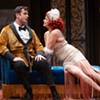Published July 19, 2006 at 2:18 p.m.
The economics of staging Broadway musicals make even shows with star-studded casts and happy endings risky endeavors. It's difficult to imagine, then, how a production called Urinetown: The Musical made it onto the Great White Way in 2001. And whatever doubts the show's title failed to raise about its mass appeal must have been exacerbated by some of the play's themes: corporate monopolization of scarce natural resources, political bribery, police brutality and the oppression of ordinary citizens.
But not only was the play mounted, it went on to earn co-creators Greg Kotis and Mark Hollmann the Tony Award "Triple Crown" - for Best Music, Lyrics and Book. The production of Urinetown: The Musical currently running at the Weston Playhouse continues that legacy with aplomb, thanks to a cast with sharp comic timing and the keen sense of irony needed to lift the play's broad humor out of the gutter and into the realm of shrewd satire. The result is a torrent of cleverness nearly overflowing with laughs.
As in many satires, the comedy is richest when the dramatic situation is most dire, and Urinetown: The Musical wastes no time in getting to that point. The show's narrator, Officer Lockstock - he's also one of its villains - brings us up to speed in the opening scene, as he and cop-cohort Officer Barrel haul Old Man Strong away for using a public restroom without paying the fee.
In the near-future world of this play - a future when, oddly enough, people dress and talk much as they did in the U.S. during the 1930s - all peeing must take place in public restrooms. These facilities are owned and operated by the Urine Good Company (UGC). Peeing elsewhere, and peeing without paying, are punishable by a one-way ticket to Urinetown, an infamous prison from which no convict has ever returned.
Old Man Strong's arrest agitates moral waters in his son, Bobby Strong, assistant custodian of Public Amenity No. 9, and inspires revolutionary thoughts. This coincides with the return home from college of Hope Cladwell, daughter of UGC boss Cladwell B. Cladwell. Hope's degree from "the most expensive university in the world" seems to have furnished her with few ideas of her own, but when she and Bobby set eyes on one another, the writing is on the wall. Their love affair will be complicated by the ensuing crackdown on Bobby and his comrades - formerly his pee patrons.
Praising individual performances in the Weston production of Urinetown: The Musical is a bit difficult, as the cast, deep with professional talent, is uniformly attuned with the play's comic sensibilities. Still, some players deserve notice for the chemistry they create with one another. Playing lovers pulled apart by strife, Margaret Nichols' Hope and D.B. Bonds' Bobby make a convincing pair. Their romantic connection is sweet, if a touch sappy, in proportion to the play's fable-like universe. Nichols, along with Thursday Farrar, who plays Public Amenity No. 9 chief custodian Penelope Pennywise, also has one of the strongest singing voices in the cast.
Marcus Neville's Officer Lockstock carries on a funny intermittent dialogue through the play with Sandi Rosa's Little Sally, a precocious waif with a teddy bear and some probing questions about why certain things are happening. Rosa is a live wire, her petite frame belying the great energy she brings to her role, and to the production overall. Neville indulges her questions with the jaded, slightly smarmy tone of a beat cop who's secretly more interested in knocking heads than upholding justice. Much of what they discuss concerns how a musical play operates - one angle from which Urinetown: The Musical satirizes not just a corrupt society but the musical genre itself.
Astute musical-theater aficionados may appreciate other cheeky references, such as songs that nod to Broadway warhorses Les Miserables and Guys & Dolls, or the cliched second-act gospel number "Run Freedom Run." Dance numbers also recognize their roots, such as in the opener "What Is Urinetown?" -- it features choreography reminiscent of Fiddler on the Roof. Another set of moves, during "Snuff That Girl," draws laughs for its homage to the menacing finger-snapping of West Side Story's gang members.
On preview night in Weston, vocal projection during some songs was a tad weak at times. This may have been attributable to sound design, or simply to performers finding their volume or meeting the challenge of intricate lyrical stylings. Perhaps because so much of what comes through is so funny, one missed the lyrics that were a little muddled.
That quibble notwithstanding, Urinetown: The Musical is a lively, smart theatrical work. Its freshness and vitality may owe something to its creators' backgrounds not in musical theater but in Chicago's improv-comedy scene. Certainly the Weston cast, under the skillful direction of Malcolm Ewen, deserves credit for maintaining such a consistently high level of comic energy while keeping a straight face.
As strange as it may seem, while this play trades on the base human impulse to urinate, it also manages to broach valid perspectives on the politics of water. Sure, films and TV shows about global warming and other environmental travesties now proliferate -- as they should -- but the consequences they foretell remain something of an abstraction to many people. Urinetown: The Musical, as broadly satirical and just plain silly as it is, may inspire a visceral reaction to environmental degradation and corporate greed. After all, while an idea might make a person gasp, laughter, like nature's call, is something one feels deep inside.
More By This Author
Speaking of...
-

Executive Director Kurt Thoma Leaves Barre Opera House
Mar 5, 2024 -

Vermonter's Musical Bound for Broadway With Hillary Clinton as a Producer
Oct 25, 2023 -

Phantom Theater Finds New Winter Venue in Waitsfield
Oct 13, 2023 -

Double E 2023 Summer Concert Series Kicks Off With the Wailers
Mar 17, 2023 -

Off Center for the Dramatic Arts to Reopen in the New North End
Sep 23, 2022 - More »
Comments
Comments are closed.
From 2014-2020, Seven Days allowed readers to comment on all stories posted on our website. While we've appreciated the suggestions and insights, right now Seven Days is prioritizing our core mission — producing high-quality, responsible local journalism — over moderating online debates between readers.
To criticize, correct or praise our reporting, please send us a letter to the editor or send us a tip. We’ll check it out and report the results.
Online comments may return when we have better tech tools for managing them. Thanks for reading.














































